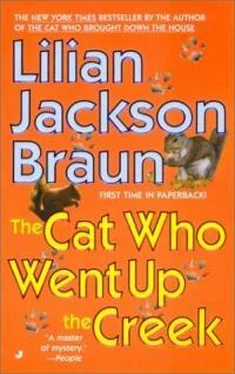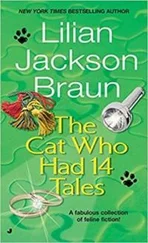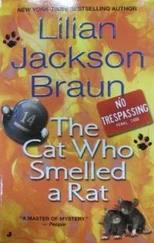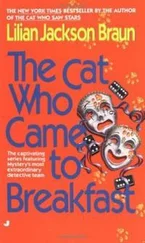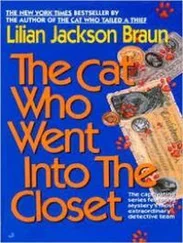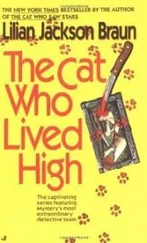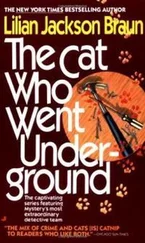“My name is Bella. May I serve you coffee? I’ve just brewed a fresh pot.”
He had brought Friday’s paper to read, and every time he read a sentence and took a sip of coffee, Bella added another splash to his cup. “You’re going to adore this ramekin,” she gushed when she served it. “I had one just before I came on duty.” Then she hovered about, in case he should want another muffin or more coffee.
Suddenly Nick Bamba appeared at his table. “Good news! We got the turret door open!”
“Sit down,” Qwilleran invited. “Have a cup of coffee. They have an oversupply in the kitchen.”
“Guess what we found! A circular staircase carved out of a single black walnut log!”
“How would it photograph?”
“Great! There’s some old furniture crowded in there, but it could be moved. And the room needs cleaning badly.”
“Then, full speed ahead, Nick. The publisher of the paper is my dinner guest tonight. I want to show it to him.”
Nick jumped to his feet. “Consider it done!” And rushed out of the room. He was famous for doing everything right now !
Qwilleran finished the ramekin and then read his newspaper with yet another cup of coffee. On the editorial page there was a letter to the editor from Black Creek, written by Brodie’s friend, Doc Abernethy. He wrote a good letter.
To the Editor—By what logic does the U.S. Postal Service treat remote rural communities like the suburbs of large cities? In a high-handed move that can be considered only as unthinking, the post offices of small towns and villages are being closed and new ones are being built in the cornfields and sheep pastures.
By tradition, and for reasons of common sense, the village post office is more than a place to buy stamps and mail packages. It is the hub of the community. Clustered around it are the grocery, drugstore, hardware, bank, coffeehouse and barbershop—depending upon and supporting each other. In the post office you bump into your neighbor and compare notes on the weather, crops, flocks, family well-being, and problems of all kinds.
What is happening now? The post offices of Little Hope and Campbelltown were the first to go. A single facility was built in a virtual wasteland in between. Soon the Little Hope Bank and the Campbelltown grocery moved out there. Gradually other businesses were forced to follow suit. Result? The downtown of each village is a ghost town. And where two grocers and barbers were earning a living, there is only one of each.
Meanwhile the price of postage goes up. Families drive farther for everyday goods and services. And what we have is a strip mall in the wilderness. Plans are under way to destroy Fishport and Black Creek. Chipmunk and Squunk Corners will be next. Who is making a profit from this maneuver? I smell a rat!
The letter was signed by Bruce Abernethy, M.D., the friend of Andrew Brodie. The chief was nobody’s fool! If he said the doctor had once had a close encounter with a wood spirit, Qwilleran was ready to believe it—or, at least, investigate it.
After breakfast, Qwilleran went for a walk about the grounds wearing shorts and sandals and a baseball cap. His moustache was recognized everywhere, of course. As goodwill ambassador for the Moose County Something, he responded to women’s admiring looks with a courteous nod and to men’s greetings with a salute. He knew he looked good in a baseball cap.
And yet, as a newcomer to the north country, he had wondered about the great number of visored caps on males in all walks of life. Then an agricultural agent told him, “Things fall off trees and out of the sky (don’t ask what), and a wise head keeps covered.” So he began his collection of baseball caps: hunter orange, red, black, yellow, and a new pale coral with an N logo.
So, matching the walls and tablecloths of the inn, Qwilleran set out to explore the grounds. The renovated mansion stood three stories high, with the third floor behind a mansard roof, and the turret rose from the southwest corner, adding a fourth-floor vantage point. Bricks were laid horizontally, vertically, diagonally and in herringbone borders—some protruding slightly to add texture to the façade. This feature was not lost on the squirrel population; with their bold claws they could run up the side of the mansion as easily as they ran up a tree. The management discouraged this activity, although guests found it endearing and reached for their cameras. Windows were tall and narrow, with inserts of stained glass. There was also a brick rampart across the front of the building—the launching pad from which Gustav Limburger had fired missiles at stray dogs. Guests preferred to sit on a paved patio at the rear and feed the squirrels. There were no expanses of neatly clipped lawn. This was a country inn, and the K Fund had specified natural landscaping: ground cover, shrubs, hedges, mammoth boulders, specimen trees, wildflowers, and herbs.
The land sloped gently down to the creek, meandering through wild gardens and the black walnut grove that had given the inn its name. Squirrels performed their acrobatics, and guests sat on park benches and fed them peanuts.
Upstream the creek cut through a dense forest that had been placed in legal conservancy by the Klingenschoen Foundation, forever to remain a wilderness performing natural services for the environment.
Downstream were five rustic cabins facing the water, which the inn offered for rent by the week, month or season. They were widely spaced and each had a screened porch overlooking the creek.
Qwilleran stood on the bank and marveled at the serenity of this waterway that had been a raging torrent in lumbering days, when logs were floated downstream during the spring thaw. Now it was about fifty feet wide—and placid as a pond. If Polly were there, he reflected, she would recite Wordsworth: The river glideth at his own sweet will, but she would change the gender of the pronoun to her.
As he watched, the only ripples were in concentric circles when another trout leaped to catch another skeeter . . . and a V-shaped wake as a duck moved effortlessly through the water, followed by half a dozen ducklings leaving their own little wakes.
The five rustic cabins on the bank of the creek were about a hundred feet apart, each with a screened porch overlooking the water, each with parking space at the rear. Walking along the footpath at water’s edge, Qwilleran checked them out in the systematic way he had.
Cabin One—Small white car with Florida plates. Cabin windows open. Woman singing a number from a Gilbert & Sullivan opera—live, not a recording.
Cabin Two—No vehicle. TV going full blast. In the front yard, young boy throwing rocks at ducks. Qwilleran chided him, and he ran indoors, where a shrill voice scolded him for talking to strangers. Qwilleran thought, City types!
Cabin Three—New SUV in parking lot. Stereo playing Schubert’s “Trout” Quintet. Did he also compose a “Duck” Sonata, “Squirrel” Concerto and “Skeeter” Rhapsody?
Cabin Four—No car. Large woman sitting on porch. He said, “Beautiful day!” She only glared at him. He decided she was deaf.
Cabin Five—No sign of life.
Farther downstream was a boat shed offering canoes and outboards for hire . . . and, in the distance, the picturesque Old Stone Bridge now used only by fishermen.
Back at the inn he found extension ladders leaning against the turret and window-washers hard at work.
In the lobby Nick signaled him. “The turret room in your suite is spic and span, but your cats are raising the roof. They don’t like being shut up in the bedroom.”
Koko’s declamatory yowl and Yum Yum’s shriek could be heard in the lobby. Qwilleran ran upstairs and released them from their prison. “Please!” he pleaded. “Do you want to get us evicted?”
Читать дальше
